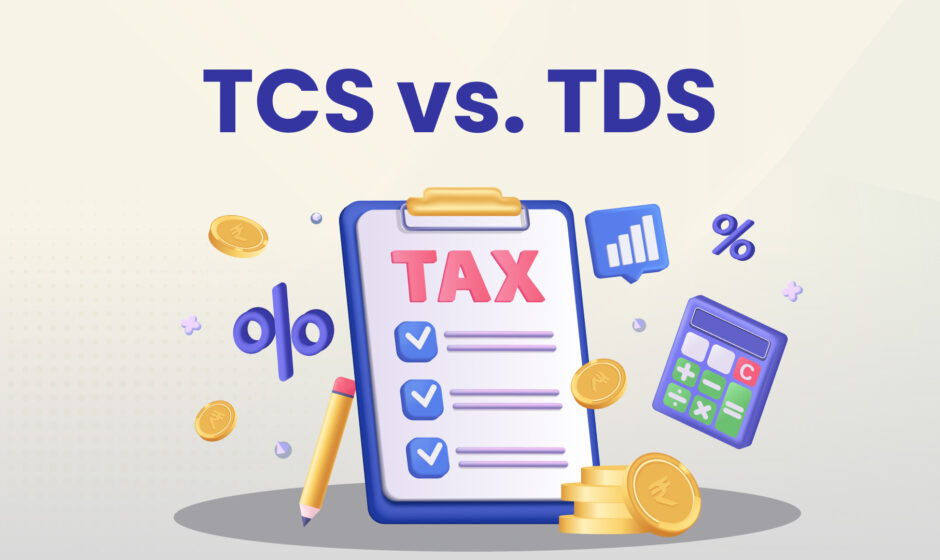Taxation can often feel like a complex puzzle, especially when terms like TDS and TCS enter the conversation. These acronyms represent Tax Deducted at Source (TDS) and Tax Collected at Source (TCS), two key mechanisms in the Indian tax system designed to collect taxes efficiently. Whether you’re an employee, a business owner, or a consumer, understanding TDS and TCS is essential for managing your finances and staying compliant with tax laws. This guide breaks down these concepts, explores their differences, and offers practical insights—all in a clear, engaging way.
What Is TDS and TCS?
At their heart, TDS and TCS are methods the government uses to collect taxes at the point of income or transaction, rather than waiting for you to file your annual tax return. They’re like the government’s way of keeping tabs on your tax obligations throughout the year.
- TDS (Tax Deducted at Source): This is a tax deducted from your income when it’s paid to you. For example, when your employer pays your salary, they deduct TDS and send it to the government on your behalf. It’s a bit like the government taking a small bite of your earnings before you even see them.
- TCS (Tax Collected at Source): This is a tax collected by the seller when you buy certain goods or services. Think of purchasing a car or jewellery—the seller adds TCS to your bill and passes it on to the government. It’s like a tax piggybacking on your shopping spree.
Both TDS and TCS are advance payments toward your final tax liability. When you file your income tax return, these amounts are credited to you. If you’ve paid more than your actual tax due, you can claim a refund; if less, you’ll owe the difference.
TDS: The Tax That’s Deducted Before You See It
TDS ensures taxes are collected as soon as income is earned. It applies to various income types, such as salaries, interest, rent, and professional fees. The responsibility falls on the payer—your employer, bank, or client—to deduct TDS and deposit it with the government.
When Is TDS Deducted?
TDS kicks in when payments exceed certain thresholds set by the Income Tax Department. Here are some common examples:
- Salaries: If your annual salary exceeds the basic exemption limit (e.g., ₹2.5 lakhs for individuals under 60), your employer deducts TDS monthly.
- Interest on Fixed Deposits: Banks deduct TDS if your yearly interest exceeds ₹40,000 (₹50,000 for senior citizens).
- Rent Payments: For rent above ₹2.4 lakhs per year, TDS is deducted at 10%.
- Professional Fees: Payments to professionals (like consultants or lawyers) over ₹30,000 per transaction attract 10% TDS.
The thresholds and rates depend on the payment type, so keeping up with current rules is key.
TDS Rates: A Quick Look
TDS rates vary by income type:
- Salaries: Based on your income tax slab.
- Interest on Securities: 10%
- Dividends: 10%
- Rent for Plant and Machinery: 2%
- Rent for Land or Building: 10%
- Professional or Technical Services: 10%
If you don’t provide your Permanent Account Number (PAN), the TDS rate jumps to 20%—a nudge to stay compliant.
Example: TDS on Salary
Suppose you earn ₹50,000 monthly. Your employer calculates your annual tax liability (say, ₹1,20,000 based on your slab) and deducts ₹10,000 each month as TDS (₹1,20,000 ÷ 12). This amount goes to the government, and when you file your return, it offsets your total tax due.
TCS: The Tax That’s Collected When You Buy
TCS flips the script—it’s collected by the seller from the buyer during specific transactions, often involving high-value or luxury items.
When Is TCS Collected?
TCS applies to certain purchases, such as:
- Motor Vehicles: Buying a car worth over ₹10 lakhs triggers a 1% TCS.
- Jewellery or Bullion: Purchases exceeding ₹2 lakhs attract 1% TCS.
- Foreign Remittances: Under the Liberalised Remittance Scheme (LRS), TCS is 5% for amounts over ₹7 lakhs annually (0.5% for education-related remittances).
- E-commerce Sales: Sellers collect 1% TCS on the gross sale amount.
TCS helps the government monitor big-ticket transactions and collect taxes upfront.
TCS Rates: A Snapshot
TCS rates depend on the transaction:
- Motor Vehicles: 1%
- Jewelry or Bullion: 1%
- Foreign Remittances (Education): 0.5% above ₹7 lakhs
- Foreign Remittances (Other): 5% above ₹7 lakhs
- E-commerce Sales: 1%
Without a PAN, TCS rates rise to 5% (or higher, if applicable).
Example: TCS on Car Purchase
Imagine you buy a ₹12 lakh car. The seller collects 1% TCS (₹12,000), so you pay ₹12,12,000 total. The ₹12,000 TCS is sent to the government and credited to you when you file your tax return.
Key Differences Between TDS and TCS
Though both are tax collection tools, TDS and TCS differ significantly:
| Aspect | TDS | TCS |
|---|---|---|
| Meaning | Tax deducted from income | Tax collected from buyers |
| Applicability | Income payments (e.g., salary, rent) | Specific goods/services (e.g., cars, jewellery) |
| Responsibility | Payer (e.g., employer, bank) | Seller (e.g., car dealer, jewellery) |
| Timing | When income is paid | When a sale is made |
| Rates | Varies by income type | Varies by goods/service |
These distinctions clarify when each tax applies, helping you stay on the right side of the law.
Compliance and Penalties: Why It Matters
Following TDS and TCS rules isn’t optional—non-compliance carries hefty consequences.
For TDS
- Late or No Deduction: 1% interest per month until deducted.
- Late Payment: 1.5% interest per month until paid to the government.
- Penalty: Up to the TDS amount under Section 271C.
For TCS
- Late or No Collection: 1% interest per month until collected.
- Late Payment: 1% interest per month until paid.
- Penalty: Up to the TCS amount under Section 271CA.
Late filing of TDS/TCS returns can also incur penalties from ₹10,000 to ₹1,00,000.
Example: Non-Compliance Cost
If a company skips deducting 10% TDS (₹50,000) on a ₹5,00,000 contractor payment, it could face interest and a penalty up to ₹50,000—a costly mistake!
Conclusion: Mastering the TDS and TCS Maze
TDS and TCS may sound intimidating, but they’re vital cogs in India’s tax machine. By grasping how they work—deducted from income or collected on purchases—you can manage your finances better and avoid surprises. Stay informed about rates and rules, keep good records, and consult a tax professional if in doubt. With this knowledge, you’ll navigate the tax landscape confidently, ensuring compliance and peace of mind.



